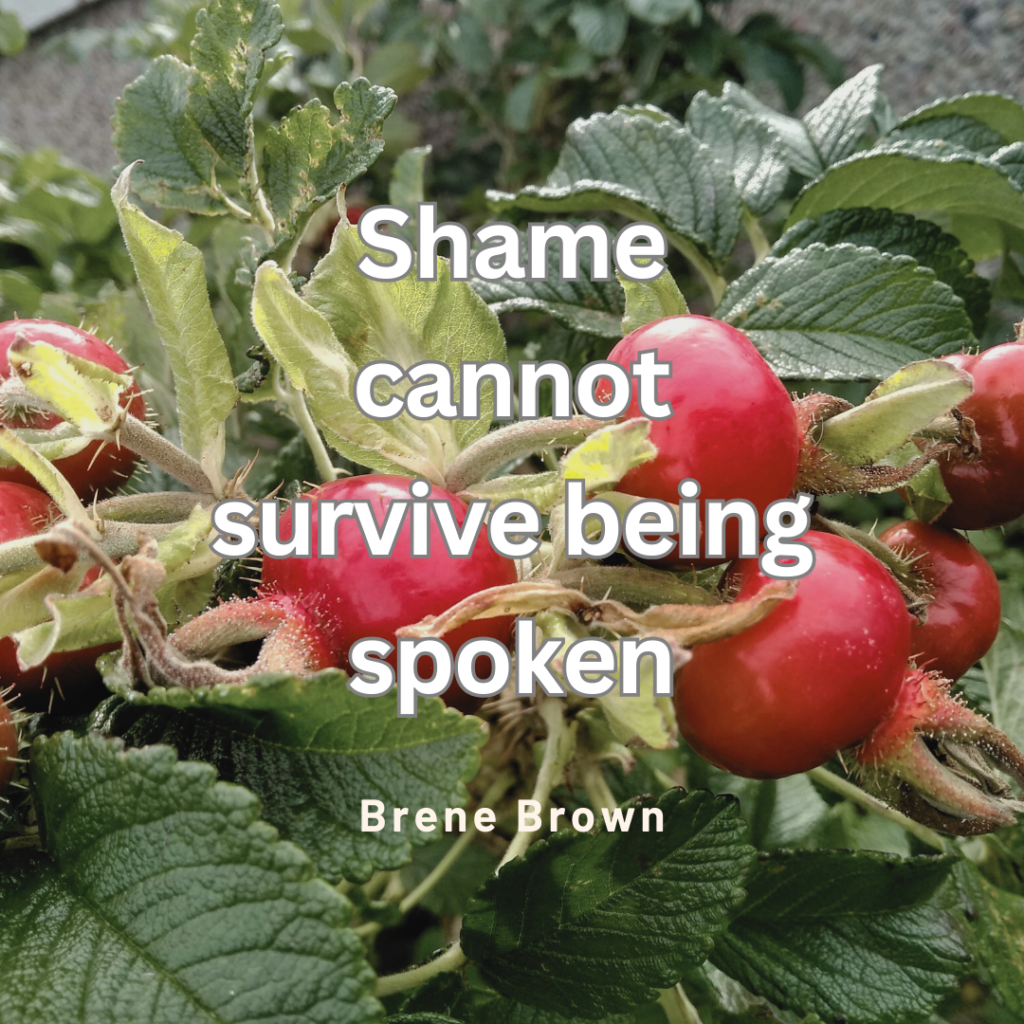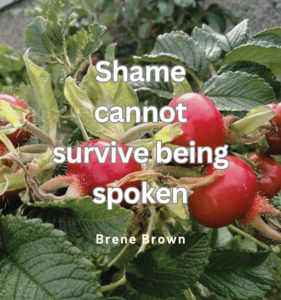She was 6 years old. Lessons in the classroom were interesting, and she found the schoolwork easy. Breaktimes, however, were torture. Obliged to go out into the playground, she walked slowly, reluctant to join the older girls who taunted her. For safety, she sought out the hand of the lady who supervised playtime. Holding tight to her hand, she walked round and round the cemented area, while an older girl followed her treading down the backs of her shoes. The supervisor said nothing. Grimly, she held on to the woman’s hand, grateful for protection from anything worse. The other children did not let her join their games, saying only girls with long hair could play. If they did condescend to let her join in, she had to be the witch. And she slowly died of shame inside, weak, ugly and unwanted.
One break-time, she was loitering on the little bridge to the playground, trying not to have to enter, watching the rippling stream that ran below. Some other girls next to her started teasing a boy who was about her age. He flew into a rage, grabbed her woollen hat, and threw it into the river. Immediately, there was a great commotion. Parents were summoned to the school. The boy was made to apologise for the loss of the hat, and the girl of course said it did not matter.
She wondered why the adults made such a fuss about a simple hat, knitted in wool, when they did not seem to notice the bullying of a little girl who had been knit together in her mother’s womb.
Things must be important. She must not be.
*****
Aghast the young girl looked at the plate smashed into pieces on the floor. She had been trying to help clear the table. Immediately she heard the shattering, her heart stopped and broke. She knew what was coming.
“How dare you smash a perfectly good plate. You are careless, clumsy thing! Pick up the pieces! Clear up the mess! We will take the cost of it out of your pocket money.”
She tried so hard not to damage things, but accidents kept happening. When she spilt the drink on the table, she rushed to mop it up anxiously, and muttered to herself, “You are so stupid! Always spilling and breaking things.”
In later years, when she was a mother herself, her toddler picked up a china ornament from her friend’s shelf, and it fell and broke into pieces. She knew it was a special souvenir from someone now passed. She waited for the tirade to begin.
“Oh, step away, come here little one, we don’t want you to cut yourself on these sharp edges. Don’t worry about the ornament. I’ll move things out of your way next time you come, so you can’t hurt yourself.” And calmly, her friend comforted the little one, and cleaned up the mess.
She learned that her friend treasured her precious daughter. She felt what it is like to know people are more valuable than possessions. She began to consider the possibility that she too was a treasure, of more worth than any inanimate object.
The next time she dropped a cup and it broke, she instinctively started to berate herself.
“You stupid, clumsy…” and then she stopped herself, and remembered she was more precious than a cup. She did not want her daughter to hear her talking to herself like that, and so learn to do the same.
“It’s OK, never mind,” she soothed herself. “I can see you are really upset. Remember, it is only a cup. You are human, just like everyone else, and everyone drops things now and then. Just clear it up safely, and you can pick out a new one, next time you are in the supermarket. Maybe a cup with spring flowers on it would be a welcome addition this time.”
*****
I wonder what strikes you from these stories? Have you had any similar experiences? What did they feel like?
What I notice in both these cases, is that inanimate objects are valued more than the person. This is dehumanising. It is what happens when a person is ridiculed or discriminated against for their race, gender or sexual orientation. The person’s intrinsic worth as a human being has been violated, and it causes shame.
Brene Brown has spent 20 years researching shame. In her book, Atlas of the Heart, she writes,
“Shame is the fear of disconnection – it’s the fear that something we’ve done or failed to do, an ideal that we’ve not lived up to, or a goal that we’ve not accomplished makes us unworthy of connection. I’m unlovable. I don’t belong… It is the intensely painful feeling or experience of believing that we are flawed and therefore unworthy of love, belonging, and connection.”
Essentially, it is that hot, shrinking feeling that I am not enough.
When my therapist first asked me if shame was an issue for me, I had no idea what he was talking about. We don’t tend to talk about shame. We pretend it does not exist, or we know that it does, and firmly refuse to talk about it.
I realised I needed to know more about shame, so I read Brene’s books and other research, and gradually my understanding grew, and I noticed that shame is everywhere, including in myself.
Shame keeps the child from telling their care-giver that they are being bullied at school. They believe that they are unlikeable.
Shame lurks in the hidden tears of the victim of sexual assault, who never tells what happened to them. They believe it was their fault.
Shame silences the child who is being abused. They sit in their classroom not wanting anyone to discover the truth of how worthless they are.
Shame skulks in the statement, “I was bullied, but it didn’t really affect me.” Denial is more comfortable than risking a glance at the past.
Shame fears the judgement of others. It hides and conceals: the alcohol use, the cutting, the porn, the failed exam, the relative in prison, the divorce. It is self-judgement.
Shame is our defensive reaction, our rush to protect our reputation and image.
Shame muzzles the domestic abuse victim. What will people think of them if they admit what is happening at home?
Shame is taboos, which can be periods, miscarriage and infertility.
Shame isolates. It thwarts relationships with other people. It is the faults that cannot be admitted, the stories that cannot be told and the past that is denied. It leaves us unable to show up wholeheartedly and authentically. We present a curated version of ourselves that forcibly represses a vital part of who we are.
My path to healing started with self-compassion. For me, a strong trigger for this was having children of my own. People have said to me over the years, “I had a terrible parent. I am learning to parent by doing the opposite to what they did.” I found that becoming a parent myself caused certain childhood memories to flood back with a new significance and impact. When I observed as an adult what my own children were like at the ages of 3, 7 or10, I realised how young and vulnerable I had been when things happened to me at these ages. Not only did it cause me to think twice about how I was wanting to parent them, but it also prompted a transformative compassion for myself when I was a child. Slowly, but surely, the belief that there was something wrong with me for what happened to me in my childhood dissipated. I was able to comfort and reassure my younger self – reparent myself. This in turn made me more compassionate to myself in the present.
The fear of what others would think of my stories started to lose its grip. I began to share them with trusted friends. They responded with compassion and empathy. The shame shrank. My petals began to unfurl.
“Shame cannot survive being spoken. It cannot tolerate having words wrapped around it. What it craves is secrecy, silence, and judgment. If you stay quiet, you stay in a lot of self-judgment.” Brene Brown
It causes me to wonder. Is there a story you need to tell? Are we creating healthy, safe families and communities, where these stories can be received with empathy, and healing found?



Pingback: Atlas of the Heart by Brene Brown - returning home to yourself
Pingback: How to Listen Well, with Empathy and Compassion - returning home to yourself
Pingback: Do I stay or do I go? The challenge of the Cult of Innocence. - returning home to yourself